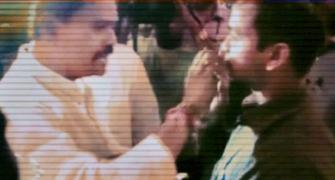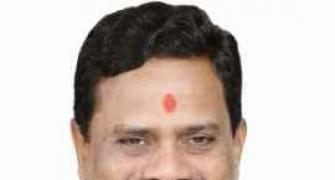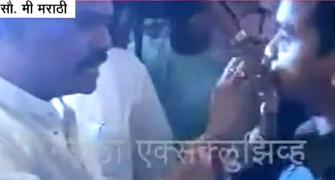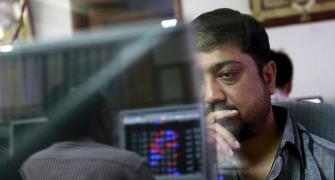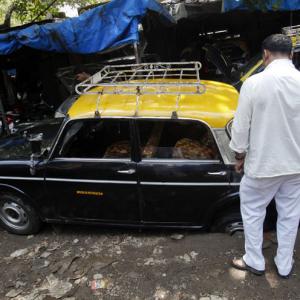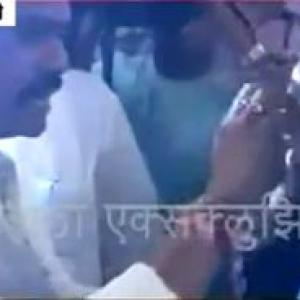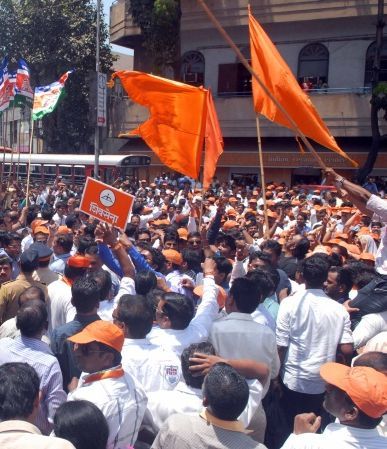 'For it's not the Sena alone that indulges in hooliganism. 'Thokshahi', as the Sena proudly calls it, is the hallmark of the party and of its offshoots. But other parties haven't exactly been models of good behaviour. Not just Maharashtra, ministers and MLAs slapping officials everywhere in the country is not unheard of, says Jyoti Punwani.
'For it's not the Sena alone that indulges in hooliganism. 'Thokshahi', as the Sena proudly calls it, is the hallmark of the party and of its offshoots. But other parties haven't exactly been models of good behaviour. Not just Maharashtra, ministers and MLAs slapping officials everywhere in the country is not unheard of, says Jyoti Punwani.
'Apologise? What for?'
As television anchors spluttered in rage at the Shiv Sena's blatant defence of their behaviour in Delhi's Maharashtra Sadan -- hooliganism in the canteen culminating in thrusting a chappati into a supervisor's mouth -- Mumbaikars watched in amusement.
This was classic Sena behaviour. Vandalism and bullying at perceived slights to themselves is the bedrock of the party. Had they apologised, that would have been big news; it would have meant the party had finally grown up. The closest they came to an apology was an expression of regret -- 'If the supervisor's religious feelings have been hurt.'
The television anchors informed them that in his complaint, the supervisor, a Muslim observing roza, had clearly stated that his feelings had been hurt. That didn't change the Sena's stand.
The Sena's qualified apology is reminiscent of Manohar Joshi's defence of the use of the derogatory term 'landya' (circumcised) for Muslims by his party. Justifying its use before the Srikrishna Commission of Inquiry into the 1992-1993 Mumbai riots, Joshi, who was then chief minister of Maharashtra, graciously agreed it should not be used 'If Muslims' feelings were likely to be hurt by it.'
This very gentleman went on to occupy the post of Lok Sabha Speaker, entrusted with the responsibility of ensuring that MPs do not use indecorous language in Parliament!
When he was asked a question about the use of the term, those present in court thought this was one question he wouldn't be able to answer. An underestimation. Not only did he defend its use, Joshi found a way to blame Muslims for the Sena calling them 'landya'. It was Muslim violence against Hindus, he said, that made him and his party address them so.
It should be noted that the Sena's newspaper Saamna used this term routinely in its editorials. Obviously, in its view, Muslims were continuously attacking Hindus.
It took Mumbaikars years to get used to this mindset of the Sena, the party that has ruled the state officially for five years but dominated Mumbai for the last 30. It was axiomatic that anyone seen to be giving offence to the Shiv Sena must be taught a lesson, 'Sena style'. The Sena's violence is always projected by them -- and importantly, by the police too -- as a reaction to provocation.
'Constructive retaliation' is how it described the way its boys hunted down unarmed Muslims across Mumbai in January 1993, in the post-Babri Masjid demolition riots.
Their conduct in the Maharashtra Sadan canteen too was projected by the MPs as a natural reaction: 'If you keep abusing, will someone not slap? How long can we tolerate this?'
In this case, the MPs' anger was provoked at a range of grievances that might turn out to be legitimate, though the person on whom they vent their anger could hardly be held responsible for them. But through the years, their anger has been provoked by anything, from Muslims/Dalits demanding their rights or merely asserting themselves, to officials refusing favours, to a railway station being painted green.
For Shiv Sainiks see themselves as Maharashtra's first citizens, and also as inheritors of Shivaji's legacy. For them, Shivaji is a symbol of Marathi Hindu pride, of independence from a perpetually hostile Delhi. Thus, being treated as nobodies in Delhi's Maharashtra Sadan, and that too by a non-Marathi official (Resident Commissioner Bipin Mallick), was the ultimate insult. It had to be avenged by the 'mards', as the Saamna editorial described them.
That the supervisor who they finally vent their rage on was a Muslim was incidental; the MPs would have done the same to anyone else. In Mumbai, they have blackened faces and vandalised offices and homes of anyone who has offended them, be they senior municipal officials such as G R Khairnar, whose house female Shiv Sainiks vandalised and were congratulated for having done so by Saamna (one of them later became the mayor of Mumbai); or principals of educational institutions who've refused to admit children recommended by them.
Why, they even vandalised Thane's Singhania hospital when the chief of the Thane unit died there, after having been injured in an accident.
None of these incidents led to a national outcry. The reason could lie as much in the absence of 24/7 private television channels in those days, as the fact that this latest outrage took place in the national capital. But one can't help but wonder -- if the canteen supervisor had been a Hindu, would we have seen the national outcry we are seeing now? Of course, the outcry is a reassuring sign that our secularism isn't dead.
On Wednesday night, NDTV anchor Nidhi Razdan fumed that people in Mumbai might be used to such behaviour, but it wouldn't do in Delhi. Undoubtedly, what has emboldened the Sena in meting out this version of punishment without crime is the indulgence shown to them by every Congress government at the Centre and in Maharashtra.
As expected, this time too, Congress Chief Minister Prithviraj Chavan has ordered a probe -- but into the MPs' complaints against the way Maharashtra Sadan is run, not into the Sena MPs' misconduct, which he has satisfied only condemned as a 'blot' on Maharashtra's 'brilliant traditions'.
What traditions is Chavan talking about? For those of us who've witnessed the Sena over the last 30 years, this kind of behaviour is the norm; indeed, it can be called Maharashtra's tradition.
Not surprising then, that neither the resident commissioner of Maharashtra Sadan, nor the state's chief secretary who actually went to the Sadan to intervene in the matter, thought it necessary to inform the CM about the fracas. Obviously, they saw it as routine Sena behaviour.
Strangely, even the television channel which obviously had the footage all along, didn't telecast it till the story broke a week later, though it would have made sensational news. It is significant that the Maharashtra Sadan manager's complaint to the resident commissioner, blames the media personnel accompanying the Sena MPs as having 'actively' instigated them. Given the cozy relationship between sections of the media and the Sena, this isn't surprising.
Ironically, the same media played the footage non-stop after the story broke, ostensibly in a bid to expose the Sena MPs. Were they unmindful of its inflammatory potential, and the humiliation this continuous telecast must have caused to the supervisor?
There are specific Indian Penal Code provisions that apply to the MPs' behaviour: Sections 349, 503 and 295 A -- force, criminal intimidation and hurting religious feelings. But for them to be applied, someone must file a complaint. Delhi is not Mumbai, but even so, have any of the parties involved gone to the police? Can Arshad Zubair, the supervisor, dare to do so? Has anyone who has been at the receiving end of a politician's wrath ever done so?
For it is not the Sena alone that indulges in hooliganism. 'Thokshahi', as the Sena proudly calls it, is the hallmark of the party and of its offshoot, the Raj Thackeray-led Maharashtra Navnirman Sena. But other parties haven't exactly been models of good behaviour. Recently, a cop who stopped and fined a Maharashtra MLA for speeding, was thrashed in the assembly by MLAs belonging to the BJP, Sena and MNS, and later suspended, after MLAs cutting across party lines protested at his audacity.
Not just Maharashtra, ministers and MLAs slapping officials everywhere in the country is not unheard of; why, a video currently doing the rounds shows the country's Home Minister Rajnath Singh slapping his security man some years back.
,p>Bullying is normal for our politicians -- and not one of them says sorry.

